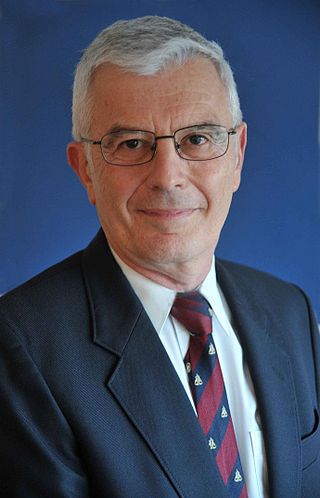
The World Jewish Congress (WJC) is an international federation of Jewish communities and organizations, founded in Geneva, Switzerland in August 1936. According to its mission statement, the World Jewish Congress's main purpose is to act as "the diplomatic arm of the Jewish people". Membership in the WJC is open to all representative Jewish groups or communities, irrespective of the social, political or economic ideology of the community's host country. The World Jewish Congress headquarters are in New York City, and the organization maintains international offices in Brussels, Belgium; Jerusalem; Paris, France; Moscow, Russia; Buenos Aires, Argentina; and Geneva, Switzerland. The WJC has special consultative status with the United Nations Economic and Social Council.

Deborah Esther Lipstadt is an American historian and diplomat, best known as author of the books Denying the Holocaust (1993), History on Trial: My Day in Court with a Holocaust Denier (2005), The Eichmann Trial (2011), and Antisemitism: Here and Now (2019). She has served as the United States Special Envoy for Monitoring and Combating Anti-Semitism since May 3, 2022. Since 1993 she has been the Dorot Professor of Modern Jewish History and Holocaust Studies at Emory University in Atlanta, Georgia, US.

In the United States Government, the Bureau of European and Eurasian Affairs (EUR) is part of the United States Department of State, charged with implementing U.S. foreign policy and promoting U.S. interests in Europe and Eurasia, as well as advising the Under Secretary of State for Political Affairs. It is headed by the Assistant Secretary of State for European and Eurasian Affairs.

The International Holocaust Remembrance Day, or the International Day in Memory of the Victims of the Holocaust, is an international memorial day on 27 January that commemorates the victims of the Holocaust, which resulted in the genocide of one third of the Jewish people, along with countless members of other minorities by Nazi Germany between 1933 and 1945, an attempt to implement its "final solution" to the Jewish question. 27 January was chosen to commemorate the date when the Auschwitz concentration camp was liberated by the Red Army in 1945.

The Holocaust had a deep effect on society both in Europe and the rest of the world, and today its consequences are still being felt, both by children and adults whose ancestors were victims of this genocide.
Secondary antisemitism is a distinct form of antisemitism which is said to have appeared after the end of World War II. Secondary antisemitism is often explained as being caused by the Holocaust, as opposed to existing in spite of it. One frequently quoted formulation of the concept, first published in Henryk M. Broder's 1986 book Der Ewige Antisemit, stems from the Israeli psychiatrist Zvi Rex, who once remarked: "The Germans will never forgive the Jews for Auschwitz." The term was coined by Peter Schönbach, a Frankfurt School co-worker of Theodor W. Adorno and Max Horkheimer, based on their critical theory.

Israel–Poland relations comprise diplomatic relations between Israel and Poland. Israel has an embassy in Warsaw, while Poland has an embassy in Tel Aviv. The Polish ambassador to Israel is Marek Magierowski, while the newly appointed Israeli ambassador to Poland is Yacov Livne, and the charge d'affaires is Tal Ben-Ari Yaalon. Both countries are members of the Organisation for Economic Co-operation and Development, the Union for the Mediterranean and United Nations.

The Office of the Special Envoy to Monitor and Combat Antisemitism is an office of the Under Secretary for Civilian Security, Democracy, and Human Rights at the United States Department of State. The office "advances U.S. foreign policy on antisemitism" by developing and implementing policies and projects to support efforts to combat antisemitism.

The International Holocaust Remembrance Alliance (IHRA), until January 2013 known as the Task Force for International Cooperation on Holocaust Education, Remembrance, and Research or ITF, is an intergovernmental organization founded in 1998 which unites governments and experts to strengthen, advance and promote Holocaust education, research and remembrance worldwide and to uphold the commitments of the Declaration of the Stockholm International Forum on the Holocaust. The IHRA has 34 member countries, one liaison country and seven observer countries.

Hannah Rosenthal is an American Democratic Party political official and Jewish non-profit executive who served as the U.S. Special Envoy for Monitoring and Combating Antisemitism from 2009 until 2012 during the Obama administration.
Randolph Marshall Bell is a former ambassador of the United States.

Aharon Mor is a Polish-born Israeli civil servant who, as senior director, heads the Restitution of Rights and Jewish Property Department at the Israeli Ministry of Pensioner Affairs, which is affiliated with the Prime Minister's Office. He has worked at the Ministry of Finance and at the Prime Minister's Office, and has represented the Jewish state abroad as an emissary in a number of international organizations.

Deborah Lyons is a Canadian diplomat. She served as Special Representative of the Secretary-General of the United Nations for Afghanistan and Head of the United Nations Assistance Mission in Afghanistan (UNAMA) during 2020 to 2022. Prior to her United Nations posting, she was Canada's ambassador to Israel (2016–2020) and to the Islamic Republic of Afghanistan (2013–2016). In October 2023, she was appointed by Prime Minister Justin Trudeau to replace Irwin Cotler as Canada's Special Envoy on Holocaust Remembrance and Combating Antisemitism.
The General Government was the German zone of occupation in Poland after the invasion by Nazi Germany and the Soviet Union in 1939, at the start of World War II. The General Government represented the middle portion of occupied Poland, with originally the West being under German control and the East under Soviet control. The basis for this split was to eliminate the Polish state and to turn all Polish nationals as stateless subjects, disregarding international law.
The working definition of antisemitism, also called the International Holocaust Remembrance Alliance definition of antisemitism or IHRA definition, is a non-legally binding statement on what antisemitism is, that reads: "Antisemitism is a certain perception of Jews, which may be expressed as hatred toward Jews. Rhetorical and physical manifestations of antisemitism are directed toward Jewish or non-Jewish individuals and/or their property, toward Jewish community institutions and religious facilities." It was first published by European Monitoring Centre on Racism and Xenophobia (EUMC) in 2005 and then by the International Holocaust Remembrance Alliance (IHRA) in 2016. Accompanying the working definition, but of disputed status, are 11 illustrative examples whose purpose is described as guiding the IHRA in its work, seven of which relate to criticism of Israel.

The Justice for Uncompensated Survivors Today (JUST) Act of 2017 is US legislation that requires the State Department to report to Congress on steps that 47 countries in Europe have taken to compensate Holocaust survivors and their heirs for assets seized by Nazi Germany and post-war communist governments.
The United Kingdom Special Envoy for Post-Holocaust Issues is responsible for developing and implementing UK Government policy with respect to encouraging the restitution of Holocaust-era assets, including art and immovable property; ensuring the accessibility and preservation of the Bad Arolsen archival record of the Nazi era and its aftermath, and promoting Holocaust education, remembrance and research.
After World War II and coming to power of the communist government in Poland, large scale nationalization occurred. Following the fall of communism in Poland in 1989, some of the formerly nationalized property have been subject to reprivatisation and restored to previous owners, their heirs or other claimants.

Gregg J. Rickman is an American former Congressional staffer and lobbyist who also served as the inaugural U.S. Special Envoy to Monitor and Combat Antisemitism from 2006 to 2009. Prior to his appointment, he was Director of Congressional Affairs at the Republican Jewish Coalition. Later he was the Deputy Director of Policy and Government Affairs at AIPAC. He also served as staffer for Republican U.S. Senators Alphonse D'Amato and Mike Rounds. In the late 1990s, he was the lead staff member of the U.S. Senate's Swiss bank inquiry.













